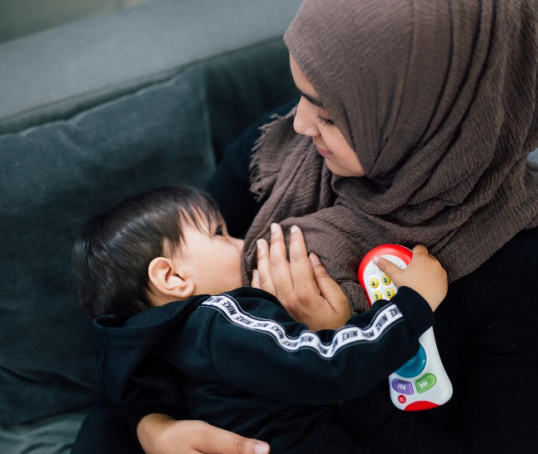Resuming your sex life after birth may take time. Every couple is different but read our guide on what to be aware of when both deciding to have sex again.
Don’t feel pressured
During the early days with a newborn, sex will probably be the last thing on your mind. You’ll both be exhausted, you have an endless list of things to do without feeling like you can get anything done. You won’t have much time to sleep let alone have sex.
It’s also likely that you and your partner’s libido will return at different times, and one of you might feel like having sex before the other one does. One or both of you might also have some worries about sex.
Don’t feel you have to have sex again before you’re ready, and if you want to have sex earlier than your partner does, don’t pressure them. Everyone is different and for some people it can take a long time before they are in a mindset where they want to have sex again (NHS, 2018a).
Worries about sex
You may both have concerns about post-birth sex, such as will it hurt? Will it feel different? How often will you have sex, or when will you have the time? The best thing is to talk about your anxieties with your partner. Remember too that there are other ways of being affectionate and tactile without having penetrative sex (Bender et al, 2018).
You can be physically close by cuddling or snuggling up together to express intimacy. It may make both of you more comfortable and take pressure off knowing that you can have a cuddle without it having to lead to anything else (Relate, no date). Let your partner know that you still have sexual feelings for them, but that you will wait for the right time for both of you.
When can you have sex after having a baby?
Most couples will do what feels right for them in their own time. No-one can say when you will be ready for sex again apart from the two of you. Many couples wait, at least, for the six-week postnatal check-up or longer.
For couples planning penetrative sex, it is recommended to wait until any post-birth bleeding has stopped (NHS, 2018b). This is because the uterus will still be healing and if you have penetrative sex before the bleeding has stopped, there’s a possibility that you could introduce an infection.
Also, until periods start again, your partner's body will produce lower levels of oestrogen (NHS, 2018c). This is the hormone that helps them get in the mood and produce vaginal lubrication. Without that lubrication, making love can be uncomfortable or even painful (NHS, 2018c). So you could either wait a while longer before having penetrative sex, or use a lubricant.
Sex after birth
When you do both feel ready, take things gently as you might both be nervous. You could start with cuddles, kisses and hand-holding. Then be prepared to find a position that puts the least pressure on any parts that are still sore and don’t penetrate too deeply. You could try:
- Spoons, where your partner lies on their side with their knees up and their back towards you, so that you can enter from behind.
- Side-by-side, where you lie facing one another with your partner’s leg over your side.
Additional lubrication can really help you both find sex pleasurable, especially as hormonal changes can make the vagina drier than normal (NHS, 2018c). Importantly, don’t forget contraception as it is possible for your partner to become pregnant before their periods return (NHS, 2018a).
As with sex during the pregnancy, go slowly and let your partner take the lead. If at any point either of you are uncomfortable or not enjoying it, then stop. If you carry on when you’re not comfortable, you might start to see sex as something you don’t want to do again (NHS, 2018a).
Will breastfeeding affect sex?
If your partner is breastfeeding then her desire to have sex is likely to be affected by a number of factors, including low levels of oestrogen.
Another effect of breastfeeding is that levels of testosterone (the ‘male’ hormone that boosts libido) may also fall, and prolactin (the milk supply hormone) rises. Oxytocin – the hormone that makes the milk flow – is also released during orgasm, so your partner’s breasts may leak during sex.
Read more about breastfeeding and sex in our article.
Keep communicating
Remember that it’s not selfish to want a love life, even when you have a young baby (Relate, no date). But if your partner doesn’t feel like it when you do, keep talking to each other and be honest about how you’re feeling.
If you’re finding it hard to find a time when having sex would even be possible, you might need to make an effort to plan some time alone together. You could ask a friend or relative to have the baby for a while so that you can both have some time with just the two of you. You don’t have to tell them what you’ll be doing… Or take the opportunity to go to bed early when baby settles down (Relate, no date).
Your sex life can change for the better, even if it’s going through a tough patch. If your love life or even your relationship deteriorates in the first months of being a family, it often gets better again – so make sure you keep lines of communication open (Relate, no date).
This page was last reviewed in November 2021
Further information
Our support line offers practical and emotional support with feeding your baby and general enquiries for parents, members and volunteers: 0300 330 0700.
Make friends with other parents-to-be and new parents in your local area for support and friendship by seeing what NCT activities are happening nearby.
Find out about relationship support and counselling from Relate
Bender SS, Sveinsdóttir E, Fridfinnsdóttir H. (2018) You stop thinking about yourself as a woman. An interpretive phenomenological study of the meaning of sexuality for Icelandic women during pregnancy and after birth. Midwifery. 62:14-19. Available at: https://www.ncbi.nlm.nih.gov/pubmed/29627594 [Accessed 12th November 2021]
NHS. (2018a) Sex and contraception after birth. Available at: https://www.nhs.uk/conditions/pregnancy-and-baby/sex-contraception-afte… [Accessed 12th November 2021]
NHS. (2018b) Early days. Available at: https://www.nhs.uk/pregnancy/labour-and-birth/after-the-birth/early-day… [Accessed 12th November 2021]
NHS. (2018c) Vagina changes after childbirth. Available at: https://www.nhs.uk/live-well/sexual-health/vagina-changes-after-childbi… [Accessed 12th November 2021]
Relate. (no date) New parents. Available at: https://www.relate.org.uk/relationship-help/help-family-life-and-parent… [Accessed 12th November 2021]





